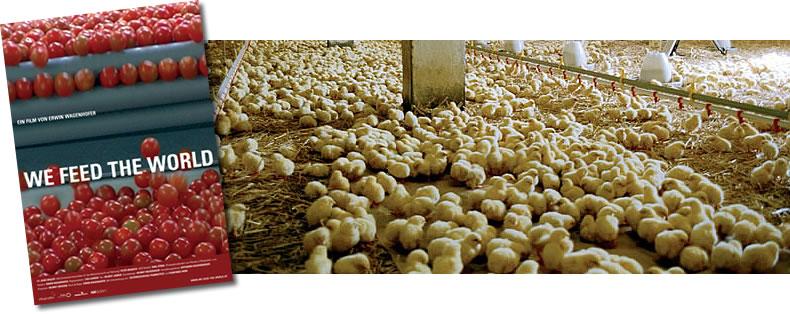We Feed the World
Submitted by literature on

Summary Movie: We Feed the World, Erwin Wagenhofer / Dokumentation
Austrian filmmaker Erwin Wagenhofer takes us back to the origins of the foods we eat. How Vienna, the capital from Austria throws away no more than two days old bread, that’s still good enough for anybody to eat. People can’t believe what they are doing because yearly there are dying over 5 million children from hunger and people are starving all over the world.
The taste of our products are chancing, because it’s the production of our foods chance. We can’t stop it, this will keep on chancing till it ends. In Spain they are producing tomato’s, also known as ‘camp tomato’s’ because they are grown in a camp that has the size of Netherland and Belgium together. In this way producers produce more tomato’s, sell more food an earn more money. All this big process causes no good to the taste of tomato’s, they taste like ‘plastic’. Production is chancing so is also the taste of our food.
The buyers and consumer have no longer an idea how things work. The industry works with livestock animals, little chickens grown up on the assembly line. Too many little chickens are raised and living in a big hall together, stayed inside for all their life’s. The little animals become fattened up and then eventually been slaughtered in a production cycle of eight weeks. It’s the life taken of these little animals. People just don’t know so many things can go wrong and how all their food is being produced.
Hard working fisherman catch fish on the sea in very big amounts. After times some fish lose the taste and quality because they’re no longer fresh any more. The real good taste of the fish get lost, but it’s still used for sale in the industry, fish that the consumers eat.
This side of how we make our food our even spill it confronts us. It call up so many questions. It’s a big problem and a side of our food that we don’t like to see.
Because nowadays people graduate from school and start working in a business, they don’t know how things work. Nobody starts building his own way up from the bottom to the top in a business any more. So they can’t see what’s happening in a business. They don’t have a relation with their roots and can’t see where things came from our how the process goes. They see farmers like most people do and have no relation to reality anymore. The only interesting thing in the productions is the price, taste becomes unimportant.
North Brazil is the biggest export country for Soya beans. Making life supplies cheaper we pay a high price. It’s absurd that people still suffer from hunger all over the world. The documentary calls up many questions that hare hard to bear or answer: Food that won’t be sold in stores is thrown away, in Austria there’s a food spill from over more that 2 million kilo’s each year. This bread is not more than a view days old, good enough for someone that suffers from hunger to eat and survive on. Yearly over more than 5 million children die from hunger, who dies on hunger is actually being murdered because there is enough food left over to feed these people all over the world.
In the World Food Report (FAO) is written that the world could feed 12 milliard people without problem. Even though the number of people dying from famine is constantly raising every year.
By Ellis Rietberg, IMB4 FHVorarberg - Media Ethics
18-4-2016


